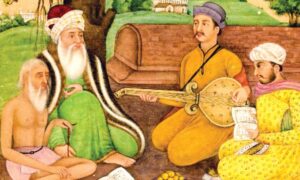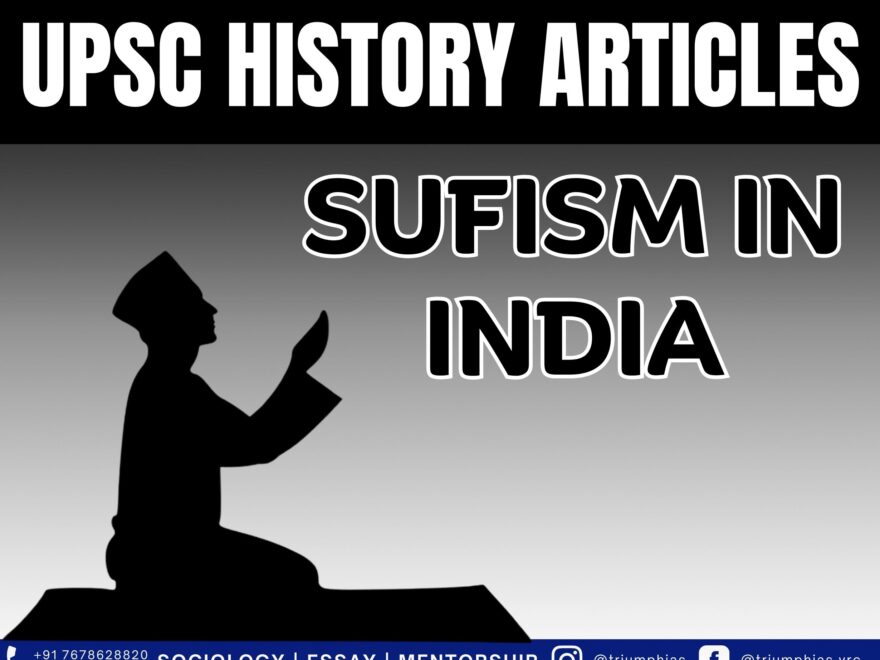Sufism in India
(Relevant for Historical section of General Studies Paper Prelims/Mains)

Sufism represents a mystical expression of Islam, characterized by its devotion to the spiritual quest for God while rejecting materialism.
This school of Islamic mysticism places a strong emphasis on asceticism and a profound dedication to divine worship.
Within the realm of Sufism, the cultivation of self-discipline is deemed indispensable for attaining a profound understanding of God through the faculties of perception.
In the early 12th century AD, a group of individuals in Persia turned to ascetic practices as a response to the increasing materialistic tendencies within the Caliphate. This group came to be known as the ‘Sufis.’
The Sufi movement first emerged in India around 1300 A.D., with its influence gradually extending to South India during the 15th century.
Sufism places significant importance on self-discipline as a fundamental prerequisite for attaining divine knowledge. In contrast to orthodox Muslims, who emphasize outward behaviour, Sufis prioritize inner spiritual purity.
Initially centered in Multan and Punjab, the Sufi movement later expanded to encompass regions such as Kashmir, Bihar, Bengal, and the Deccan.
The term ‘Sufi’ is probably derived from the Arabic ‘sufi’ word which means ‘one who wears wool’. This is because woolen clothes were generally associated with ascetics. Another possible origin of the word is ‘safa’ which means purity in Arabic.
Major Sufi Orders
Chisti:
The Chishtiya Order was established in India by Khwaja Moin-Uddin Chishti.
It highlighted the concept of the unity of being with God (waḥdat al-wujud), and its members were known for their commitment to pacifism.
Rejecting all material possessions as distractions from their contemplation of God, the adherents of this order maintained a detachment from worldly goods.
They also maintained a deliberate separation from involvement with secular political affairs.
Central to the Chishtī practice was the recitation of God’s names, both aloud and silently (dhikr jahrī, dhikr khafī).
The teachings of the Chishty Order were propagated and made popular by followers of Khwaja Moin-Uddin Chishti, such as Khwaja Qutbuddin Bakhtiyar Kaki, Fareeduddin Ganj-e-Shakar, Nizam uddin Auliya, and Naseeruddin Charagh.
Suhrawardi Order:
- It was founded by Sheikh Shahabuddin Suharwardi Maqtul. The Suhrawardis, unlike the Chishtis, accepted maintenance grants from the Sultans.
Naqshbandi Order:
- It was founded by the Khwaja Baha-ul-din Naqsh band. In India, this order was established by Kawaka Bahauddin Naqshbandi.
- From the beginning, the mystics of this Order stressed on the observance of the Shariat.
Qadiriyya Order:
- It was popular in Punjab. Sheikh Abdul Qadir of Badaun founded it in the 14th century.
- They were supporters of the Mughals under Akbar.
To master these intricacies and fare well in the Sociology Optional Syllabus, aspiring sociologists might benefit from guidance by the Best Sociology Optional Teacher and participation in the Best Sociology Optional Coaching. These avenues provide comprehensive assistance, ensuring a solid understanding of sociology’s diverse methodologies and techniques.
Sufism, India, Sufism in India, Sufi Orders, Chisti, Suhrawardi, Naqshbandi, Qadiriyya, Islamic mysticism, Khwaja Moin-Uddin Chishti, Sheikh Shahabuddin Suharwardi, Khwaja Baha-ul-din Naqsh band, spiritual journey, ascetic practices, waḥdat al-wujūd, Sufi history, Sufism, India, Sufi Orders, Chisti, Suhrawardi, Naqshbandi, Qadiriyya, Islamic mysticism, Khwaja Moin-Uddin Chishti, Sheikh Shahabuddin Suharwardi, Khwaja Baha-ul-din Naqsh band, spiritual journey, ascetic practices, waḥdat al-wujūd, Sufi history, Sufism in India, Sufism in India, Sufism in India, Best Sociology Optional Coaching, Sociology Optional Syllabus.

Choose The Best Sociology Optional Teacher for IAS Preparation?
At the beginning of the journey for Civil Services Examination preparation, many students face a pivotal decision – selecting their optional subject. Questions such as “which optional subject is the best?” and “which optional subject is the most scoring?” frequently come to mind. Choosing the right optional subject, like choosing the best sociology optional teacher, is a subjective yet vital step that requires a thoughtful decision based on facts. A misstep in this crucial decision can indeed prove disastrous.
Ever since the exam pattern was revamped in 2013, the UPSC has eliminated the need for a second optional subject. Now, candidates have to choose only one optional subject for the UPSC Mains, which has two papers of 250 marks each. One of the compelling choices for many has been the sociology optional. However, it’s strongly advised to decide on your optional subject for mains well ahead of time to get sufficient time to complete the syllabus. After all, most students score similarly in General Studies Papers; it’s the score in the optional subject & essay that contributes significantly to the final selection.
“A sound strategy does not rely solely on the popular
Opinion of toppers or famous YouTubers cum teachers.”
It requires understanding one’s ability, interest, and the relevance of the subject, not just for the exam but also for life in general. Hence, when selecting the best sociology teacher, one must consider the usefulness of sociology optional coaching in General Studies, Essay, and Personality Test.
The choice of the optional subject should be based on objective criteria, such as the nature, scope, and size of the syllabus, uniformity and stability in the question pattern, relevance of the syllabic content in daily life in society, and the availability of study material and guidance. For example, choosing the best sociology optional coaching can ensure access to top-quality study materials and experienced teachers. Always remember, the approach of the UPSC optional subject differs from your academic studies of subjects. Therefore, before settling for sociology optional, you need to analyze the syllabus, previous years’ pattern, subject requirements (be it ideal, visionary, numerical, conceptual theoretical), and your comfort level with the subject.
This decision marks a critical point in your UPSC – CSE journey, potentially determining your success in a career in IAS/Civil Services. Therefore, it’s crucial to choose wisely, whether it’s the optional subject or the best sociology optional teacher. Always base your decision on accurate facts, and never let your emotional biases guide your choices. After all, the search for the best sociology optional coaching is about finding the perfect fit for your unique academic needs and aspirations.
To master these intricacies and fare well in the Sociology Optional Syllabus, aspiring sociologists might benefit from guidance by the Best Sociology Optional Teacher and participation in the Best Sociology Optional Coaching. These avenues provide comprehensive assistance, ensuring a solid understanding of sociology’s diverse methodologies and techniques. Sociology, Social theory, Best Sociology Optional Teacher, Best Sociology Optional Coaching, Sociology Optional Syllabus.
Best Sociology Optional Teacher, Sociology Syllabus, Sociology Optional, Sociology Optional Coaching, Best Sociology Optional Coaching, Best Sociology Teacher, Sociology Course, Sociology Teacher, Sociology Foundation, Sociology Foundation Course, Sociology Optional UPSC, Sociology for IAS,
Follow us :
🔎 https://www.instagram.com/triumphias
🔎https://www.youtube.com/c/TriumphIAS
https://t.me/VikashRanjanSociology
Find More Blogs
|
Scope of the subject and comparison with other social sciences |
|||
|
|
|
|
Modernity and social changes in Europe |

